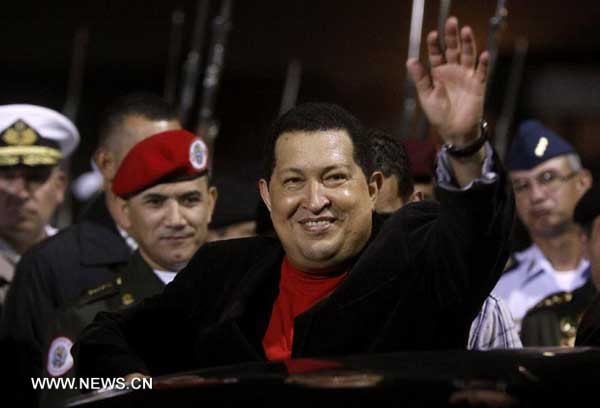Chavez dies, Maduro becomes interim president
- By Li Xiaohua
 0 Comment(s)
0 Comment(s) Print
Print E-mail China.org.cn, March 6, 2013
E-mail China.org.cn, March 6, 2013
|
|
|
File photo taken on March 16, 2012 shows Venezuelan President Hugo Chavez greeting his supporters on his arrival at the Simon Bolivar International Airport of Maiquetia, Caracas, Venezuela. Venezuelan government confirmed President Hugo Chavez' death on March 5, 2013. |
The executive vice president of Venezuela, Nicols Maduro, on Tuesday reported on national radio and television, from Caracas, President Hugo Chavez lost the battle for his life against cancer.
With tears in his eyes, Mature addressed Venezuelans from a Caracas military hospital, where Chavez spent his final two weeks after he came back from Cuba on Feb. 18.
"Commander, wherever you are, thank you for all you did for us, " he said, accompanied by some members of the executive cabinet and high command military officials.
After seeking medical treatment for 70 days in Cuba, he returned home on Feb. 18. Since then, he has stayed in the military hospital Doctor Carlos Arvelo in Caracas.
Not long after the news of Venezuelan President Hugo Chavez's death was released to the world on March 6, 2013, his supporters gathered at Simon Bolivar Square in the country's capital of Caracas to mourn him, wearing red T-shirts emblazoned with the logo "I am Chavez" and holding up pictures and slogans.
According to the Venezuelan constitution, Vice President Nicolas Maduro now serves as interim president. Elections will be called within 30 days and analysts believe that Maduro will be the candidate more likely to win.
Chavez publicly named Maduro as his political successor and before leaving for Cuba to receive his last round of cancer treatment, Chavez voiced his hopes that people would vote for Maduro should elections be held. It is expected that Chavez supporters will vote for Maduro.
In addition, the military has clarified there is little possibility that it would help in the event of a rebel coup.
Maduro was born in Caracas on Nov.23, 1962. He proved to be an outstanding student leader in the 1970s and 1980s. Later on, he worked as a bus driver and from there went on to become the leader of the Metro union in Caracas. He later served his country as foreign minister (2006-2013) and vice president (Oct. 2012- March 2013).
Chavez got to know Maduro in the 1980s. Maduro was chosen to participate in the drafting of the new constitution when Chavez became president in 1998. Maduro later joined and became head of the law-making National Assembly.
Maduro was named foreign minister on Aug.9, 2006, and became vice president on Oct. 10, 2012. Chavez appointed Maduro his political successor on Dec. 9, 2012.
BBC analysts say whereas Hugo Chavez was a charismatic whirlwind, the"lifelong socialist" Maduro comes across as just the opposite, a quiet man. Maduro has been credited with being a wily operator and a skilled negotiator. He may be able to hold together Venezuela's various factions such as the military and those groups more ideologically driven.
Maduro's long-standing ties with Cuba are seen as being to his advantage. He has been following the Chavez line to openly seek the "construction of a multi-polar world free from the hegemony of American imperialism."







Go to Forum >>0 Comment(s)